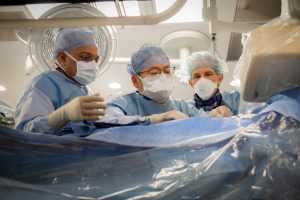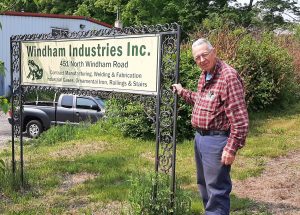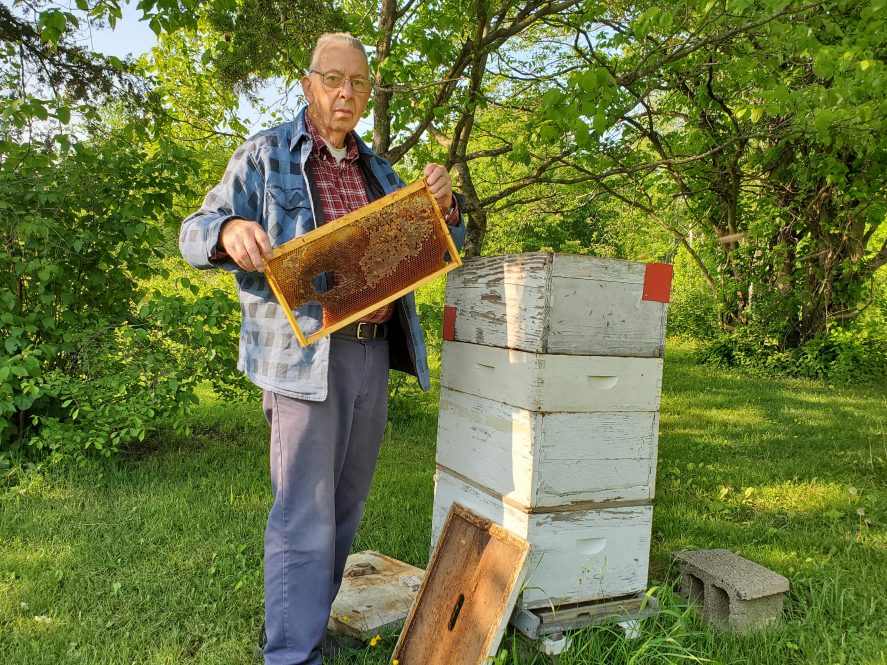On the last 45 Memorial Day holidays, Navy Veteran William “Bill” Rood, 83, of North Windham has done the pilgrimage to local Connecticut cemeteries to lay wreaths upon the graves of fallen military. He served the U.S. Navy from 1957-1961.
But planning for this Memorial Day included a health challenge. Rood wasn’t sure he’d be physically up to the pilgrimage, nor able to deliver an invited speech to his town on Memorial Day.
“I was coughing non-stop, and the cough wasn’t getting better, I was having difficulty breathing and walking, and I couldn’t sleep,” says Rood who even ended up in the Emergency Room in the middle of the night. “I was weak, I was sick, I couldn’t move, I was out of breath. I knew I was sick but didn’t realize how sick.”
It turns out the chronic cough that Rood couldn’t shake, along with the other debilitating symptoms, were caused by aortic stenosis, a narrowing of his heart’s aortic valve. It was even causing his heart to become enlarged with fluid building up in his lungs.

“UConn Health really came through for me,” exclaims the Navy Veteran who on May 11 underwent a newly available procedure at UConn Health called TAVR (Transcatheter aortic valve replacement). “My heart doctors put this new valve in me – and it works! It actually works excellent! I’m now breathing much better and interestingly I actually watched my heart pumping my blood flawlessly through the new valve the next morning when they did an echocardiogram!”
“The less-invasive alternative to open-heart surgery called TAVR combines the surgical expertise of Dr. Chittoor B. Sai Sudhakar, chief of cardiothoracic surgery at UConn Health who has significant experience in the field of TAVR, and Dr. JuYong Lee, interventional cardiologist who serves as director of the structural heart program, director of vascular medicine, endovascular medicine, and the non-invasive vascular laboratory. The minimally invasive procedure offers patients prompt relief from their symptoms and return to their daily activities.
Narrowing of the aortic valve occurs as we age when calcium builds up around the valve’s opening restricting proper blood flow to the rest of the body. The common older adult heart condition affects more than 20% of those over the age of 65. If left untreated, aortic stenosis can lead to debilitating heart failure or even death. Warning signs may include fatigue; shortness of breath; chest pain; rapid fluttering heartbeat; trouble walking short distances; reduced routine activity level; fainting and lightheadedness.
“With a heart procedure, you are entrusting your life to these people. I felt quite confident with Dr. Lee and Dr. Sai,” he says. “I told my heart doctors if they did a good job, I would walkout out of the building and if they didn’t they would carry me out. I walked out and obviously Dr. Lee and Dr. Sai did a very good job and I am thankful!”
In addition to the excellent cardiac care outcome provided by Sudhakar and Lee, Rood also acknowledges the key role of nurse and program coordinator Kristen Bryant who always made sure he got all the care and information he needed. “Kristen is a real asset to UConn Health. She is excellent and gets an A+ from me.”
Interestingly, while Rood’s heart condition was fixed successfully by UConn Health, he actually previously fixed up the institution personally. “In UConn Health’s Main Building my steel working company and I put in all the designs and fabricated the catwalks in the penthouse,” proudly recalls Rood.
The day after his heart procedure, it was no longer “tough” to walk a short distance. Rood was walking to his backyard and caring for his three hives of honeybees. Also, a week after surgery Rood, the longtime business owner of the steel working company Windham Industries Inc. in North Windham now run by his son, was back in his office working on the computer and looking over the company’s steel, metal product designs.

“UConn Health has been so good to me! They have gone out of their way to help me – and with very good results! The TAVR procedure was far superior to open-heart surgery to repair my heart. If you look at me, you would never know that I had a lifesaving valve replacement only days ago. The only visual symptom is a black and blue area next to one of the incision sites. Medicine today is unbelievable,” says Rood.
His strong message to others struggling with ongoing symptoms: “If you have a cough that is not going away, get checked. Don’t tough it out. And make sure you have a good primary care doctor. They are invaluable,” says Rood whose UConn Health Storrs primary care physician, Matt Sleboda, stepped in and got him connected to the heart doctors at UConn Health’s Calhoun Cardiology Center for follow-up care. “UConn Health got me in right away!”
Thanks to his successful heart repair at UConn Health, Memorial Day 2023 will be extra special for Rood. He spent the week following his heart procedure working on his Memorial Day speech for his town. He is so grateful to have the opportunity to deliver his speech on May 29 after laying wreaths, and not being out of breath, as Memorial Day means a great deal to him as a veteran.
“It is to pay homage to the people who served our country. We are an incredible country. For over 200 years we have been a beacon to the world. We are a nation of immigrants. They came to this country for freedom,” he says.
“I tell people I joined the Navy because they wore the white hats, they are the good guys,” says Rood with a smile who served as a Navy electronics technician. “I saw a lot of water in the Navy. I really enjoyed my military service. I had a lot of good friends who served their country including one who was a P.O.W. We need to remember our prisoners of war. I had uncles on both sides of my family who served in WWII. I joined the Navy because I believed that it was my duty to serve and protect my country.”
Rood stresses: “We owe a lot to the Veterans who came before us. I admire them and those who stand up. We need to respect all that they did.”
He says his speech on Memorial Day will be a “battle cry” for all fellow Veterans to “stand up and be counted.”
UConn Health is happy that Rood could count on us for his heart care.
UConn Health thanks U.S. Veterans for their military service to our country.



